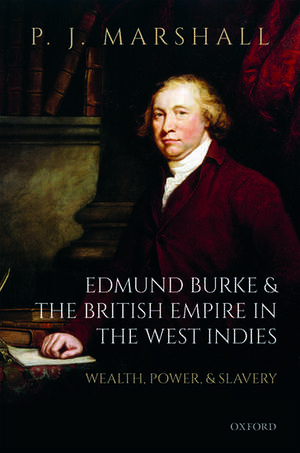Edmund Burke and the British Empire in the West Indies: Wealth, Power, and Slavery
Autor P. J. Marshallen Limba Engleză Hardback – 9 iul 2019
Preț: 570.03 lei
Preț vechi: 757.34 lei
-25% Nou
Puncte Express: 855
Preț estimativ în valută:
109.09€ • 113.47$ • 90.06£
109.09€ • 113.47$ • 90.06£
Carte tipărită la comandă
Livrare economică 02-08 aprilie
Preluare comenzi: 021 569.72.76
Specificații
ISBN-13: 9780198841203
ISBN-10: 0198841205
Pagini: 258
Ilustrații: 8 black and white figures/maps
Dimensiuni: 162 x 241 x 21 mm
Greutate: 0.57 kg
Editura: OUP OXFORD
Colecția OUP Oxford
Locul publicării:Oxford, United Kingdom
ISBN-10: 0198841205
Pagini: 258
Ilustrații: 8 black and white figures/maps
Dimensiuni: 162 x 241 x 21 mm
Greutate: 0.57 kg
Editura: OUP OXFORD
Colecția OUP Oxford
Locul publicării:Oxford, United Kingdom
Recenzii
One of the most striking aspects of Marshall's book is its author's intellectual honesty. Despite his broad sympathy for Burke as a political thinker, on the specific issue of slavery and the slave trade Marshall is unwilling to evade the implications suggested by the evidence he meticulously adduces.
This book is the result not only of a huge amount of research but of decades of intellectual engagement with the question of 18th-century Britain's relationship -- both desired and actual -- with its colonies. For those who wish to learn in meticulous detail about how these arrangements worked, Edmund Burke and the British Empire in the West Indies will be immensely illuminating.
The book represents Burke scholarship at its very finest in the sense that it not only deepens our understanding of this remarkable political and intellectual virtuoso -- and as such he must be described despite his failings -- but also of the period as a whole in all its complexity. Marshall is neither in the business of exonerating nor that of crucifying Burke, and his tone strikes a masterful balance by avoiding smug realism and hysterical moralism alike. In short, this book is a must-read for all historians of eighteenth-century Britain, its empire and the slave trade.
this work excels at using private and official correspondence and recorded speeches before Parliament to investigate the politics of British colonialism in the West Indies and in nuancing Burke's relationship with regulating the slave trade. This work would be particularly useful to scholars researching Burke's connections to the Caribbean and the slave trade as well as those interested in the political logics that guided the British abolitionist movement.
[a] meticulous study ... impeccable scholarship
Edmund Burke and the British Empire in the West Indies provides the most comprehensive historical portrait to date of Burke's views on slavery and of his wider participation in the politics of the British West Indies. Whereas Burke's attitudes toward the American and Indian colonies are by now familiar to Burke readers and the informed public, Marshall's book has unlocked a new trove of material and insights that will sharpen our understanding of his engagement with Britain's Caribbean possessions.
This book is the result not only of a huge amount of research but of decades of intellectual engagement with the question of 18th-century Britain's relationship -- both desired and actual -- with its colonies. For those who wish to learn in meticulous detail about how these arrangements worked, Edmund Burke and the British Empire in the West Indies will be immensely illuminating.
The book represents Burke scholarship at its very finest in the sense that it not only deepens our understanding of this remarkable political and intellectual virtuoso -- and as such he must be described despite his failings -- but also of the period as a whole in all its complexity. Marshall is neither in the business of exonerating nor that of crucifying Burke, and his tone strikes a masterful balance by avoiding smug realism and hysterical moralism alike. In short, this book is a must-read for all historians of eighteenth-century Britain, its empire and the slave trade.
this work excels at using private and official correspondence and recorded speeches before Parliament to investigate the politics of British colonialism in the West Indies and in nuancing Burke's relationship with regulating the slave trade. This work would be particularly useful to scholars researching Burke's connections to the Caribbean and the slave trade as well as those interested in the political logics that guided the British abolitionist movement.
[a] meticulous study ... impeccable scholarship
Edmund Burke and the British Empire in the West Indies provides the most comprehensive historical portrait to date of Burke's views on slavery and of his wider participation in the politics of the British West Indies. Whereas Burke's attitudes toward the American and Indian colonies are by now familiar to Burke readers and the informed public, Marshall's book has unlocked a new trove of material and insights that will sharpen our understanding of his engagement with Britain's Caribbean possessions.
Notă biografică
P. J. Marshall taught at King's College, London, from 1959 until his retirement in 1993 as Rhodes Professor of Imperial History. He is a past President of the Royal Historical Society and a Fellow of the British Academy.
